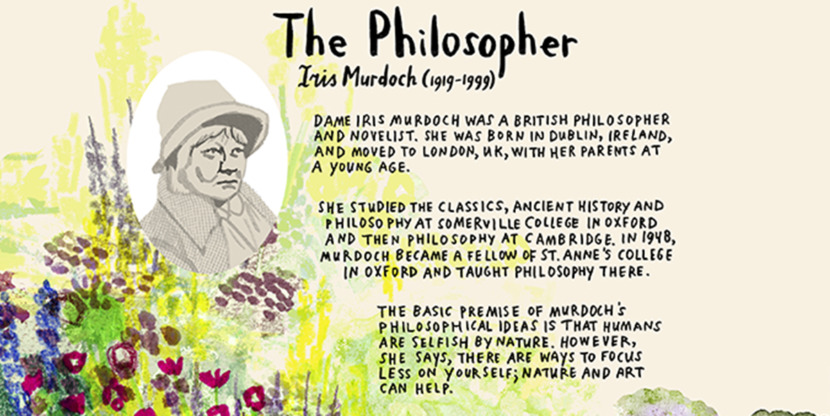The philosopher Iris Murdoch

In each issue we discuss the philosophy of a great thinker, using a number of illustrations. This time it is Iris Murdoch (1919-1999).
- Dane Iris Murdoch was a British philosopher and novelist. She was born in Dublin, Ireland, and moved to London, UK, with her parents at a young age.
- She studied the classics, ancient history and philosophy at Somerville college in Oxford and then philosophy at Cambridge. In 1948 Murdoch became a fellow of St. Anna’s college in Oxford and taught philosophy there.
- The basic premise of Murdoch’s philosophical ideas is that humans are selfish by nature. However, she says, there are ways to focus less on yourself; nature and art can help.
- When you enjoy a novel, painting or play, you’re not focusing solely on yourself. Good works of art show the world the way it is. Nature can also teach you to shift your gaze outward by taking a closer look at things and, according to Murdoch by focusing on things and people other than yourself, you can grow to become a morally better person.
- In 1956, Murdoch married professor, author and literary critic John Bayley, wo whom she remained married until her death. Murdoch had relationships with other men and supposedly also other women, even though she always denied the latter.
- In addition to her philosophical works, Murdoch also wrote more than twenty novels, homosexual characters figured in her books, even though this was generally not considered acceptable at the time. In 1978, she won the booker prize for her novel, The sea, the sea.
- Murdoch was diagnosed with alzheimer’s disease in 1995 and she died in 1999 at the age of 79.
- Later that year, Bayley’s book Elegy for Iris, a memoir about his life with Murdoch, was published. It was adapted into the movie Iris in 2001 and starred Kate Winslet and Judi Dench.
Text Caroline Buijs Illustrations Deborah van der Schaaf








